‘It’s a non-discussion, that the UU is seen as too white’

In the UU for Everybody theme magazine about diversity at the university, we had an article about diversity dilemmas. The main question in the story focused on how to ensure that everyone feels welcome. Do we, for instance, need gender-neutral bathrooms? Should you provide alcoholic drinks when you know not everyone appreciates that? Should English be the main language spoken at the UU? How do you make sure you can beat (subconscious) biases when collaborating with others, or assessing students’ work?
Lacking nuance
Those were a few of the dilemmas we confronted readers with through an online questionnaire – in both Dutch and English. It wasn’t a scientific study. The idea was that with the questions and multiple-choice answer options we formulated, we could at least form an idea of how the UU population thinks about the diverse university.
Not everyone agreed with our phrasings. Several respondents called them ‘lacking nuance’, ‘too narrow’, or ‘steering too much’. One person annoyed with one of the answers for the question of whether or not classes are taught too much from a western perspective: ‘No. We’re living in the Netherlands, so this makes sense. All that whining about slavery and ‘wrong’ heroes, you shouldn’t burden educational programs with that.’ Another participant didn’t care in the slightest whether or not the university installed gender-neutral bathrooms, and that answer wasn’t available. Other respondents would also have liked to see the option to clarify their answers. “Whether a master’s program should be taught in English depends on the kind of program. For a research master’s English is a good idea, but for a program like ‘Clinical Psychology’, I don’t necessarily think it’d be a good development.”
In the end, 533 people filled out the Dutch questionnaire, of whom two thirds were students. A little over half of respondents were women; for 11 percent, it was deemed impertinent to ask the respondent’s gender.
We weren’t quite as successful in reaching the internationals. Only 41 internationals filled out the questionnaire, three quarters of them students, and 60 percent female. Three percent thought the question impertinent.
The questionnaire gives a rough image of how students and employees really feel about the diverse university. Most of them see it as a positive thing, even if they don’t necessarily see the suggested dilemmas as actual problems. When asked whether they agree with the statement that the UU is seen as a white university, 66 percent says it’s a non-discussion because everyone who wants to come to the UU, is welcome. Half of internationals also agrees with that.
Gender-neutral bathrooms
Recently, a pilot started with gender-neutral bathrooms. What do students and employees feel about this? The respondents are divided. Around 40 percent says gender-neutral bathrooms aren’t necessary, because it’s only a small group of people who needs them. Half of the remaining 60 percent says all bathrooms should be gender-neutral, and the other half says they should co-exist alongside the male and female bathrooms. Almost 80 percent of internationals says we should have gender-neutral bathrooms.
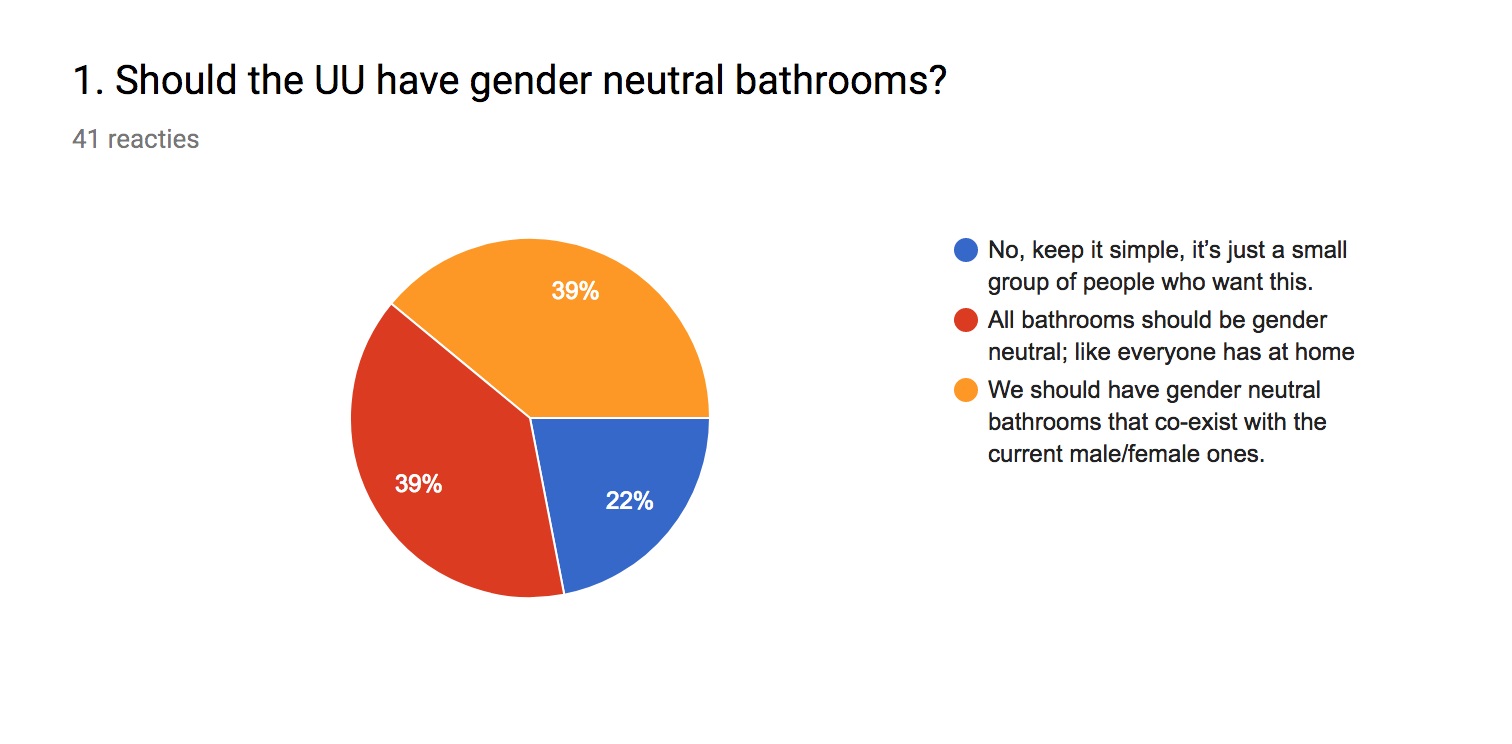
Results of the English survey
No need for safe spaces
We also asked about the language of a diverse university. A large majority (including the internationals) says all communication should be done in two languages. The choice of whether a master’s is taught in English or Dutch, should be less rigid than the current policy, which prescribes ‘English unless’. A little over half of respondents say Dutch should be the norm, and that study programs should be allowed to choose for themselves whether a master’s is taught in English.
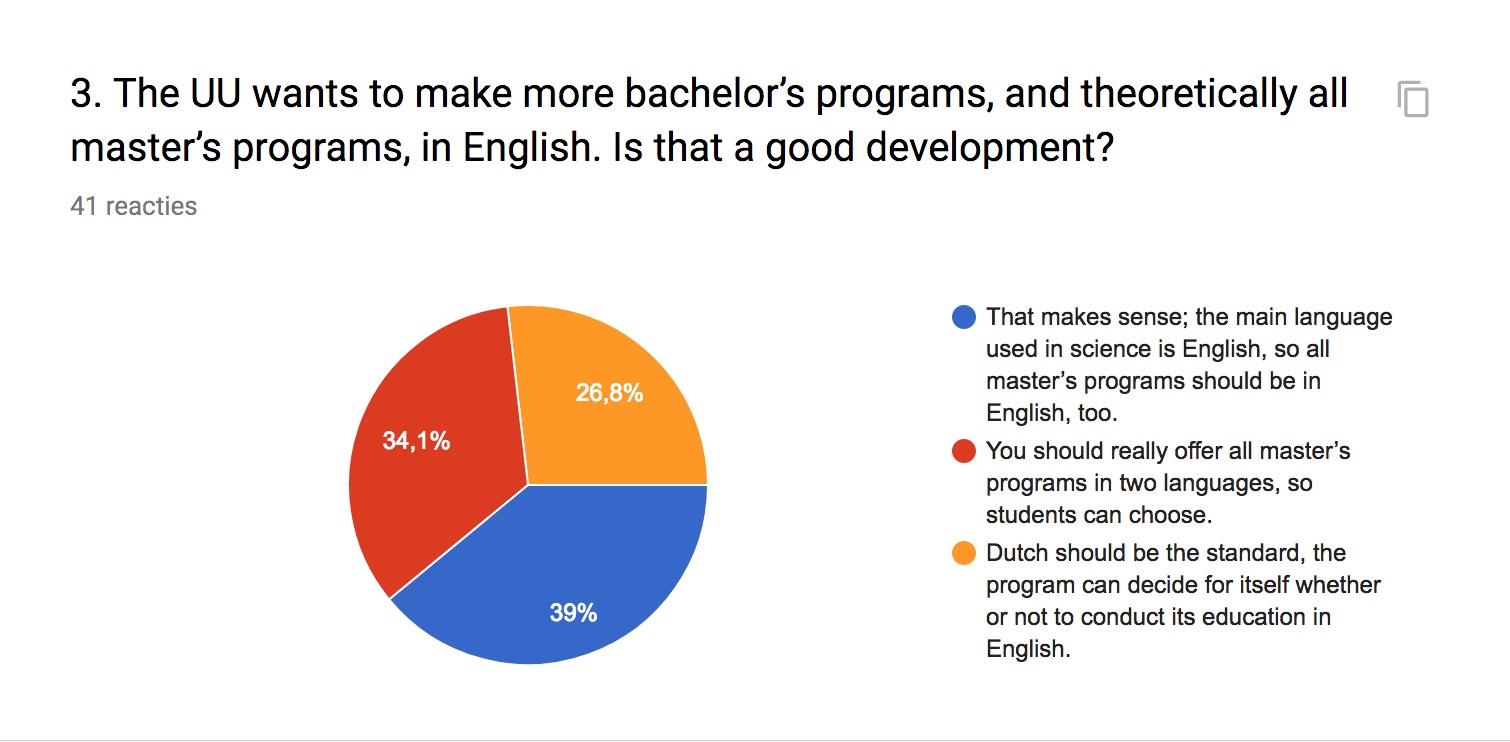
Results of the English survey
A diverse university has consequences for collaborations. How far do you go in taking others into consideration? Recently, it was shown that international students in Groningen weren’t exactly pleased with the remarks (often meant as jokes) they often heard. They were insulting, and sometimes experienced as down-right racist. A Mexican PhD candidate may think it’s funny once to be called Consuela – after a cleaning lady from a TV show – but after ten times, it becomes painful. There were several similar examples.
We didn’t ask about this in our questionnaire. There is no need for safe spaces – places where you’re free from criticism on gender, origins or disability - like campuses in the US often have. “Let everyone just be free. You should be able to speak freely at the university. When someone thinks a remark is wrong or insulting, you should be able to talk about this,” 67 percent thinks – 70 percent among internationals.
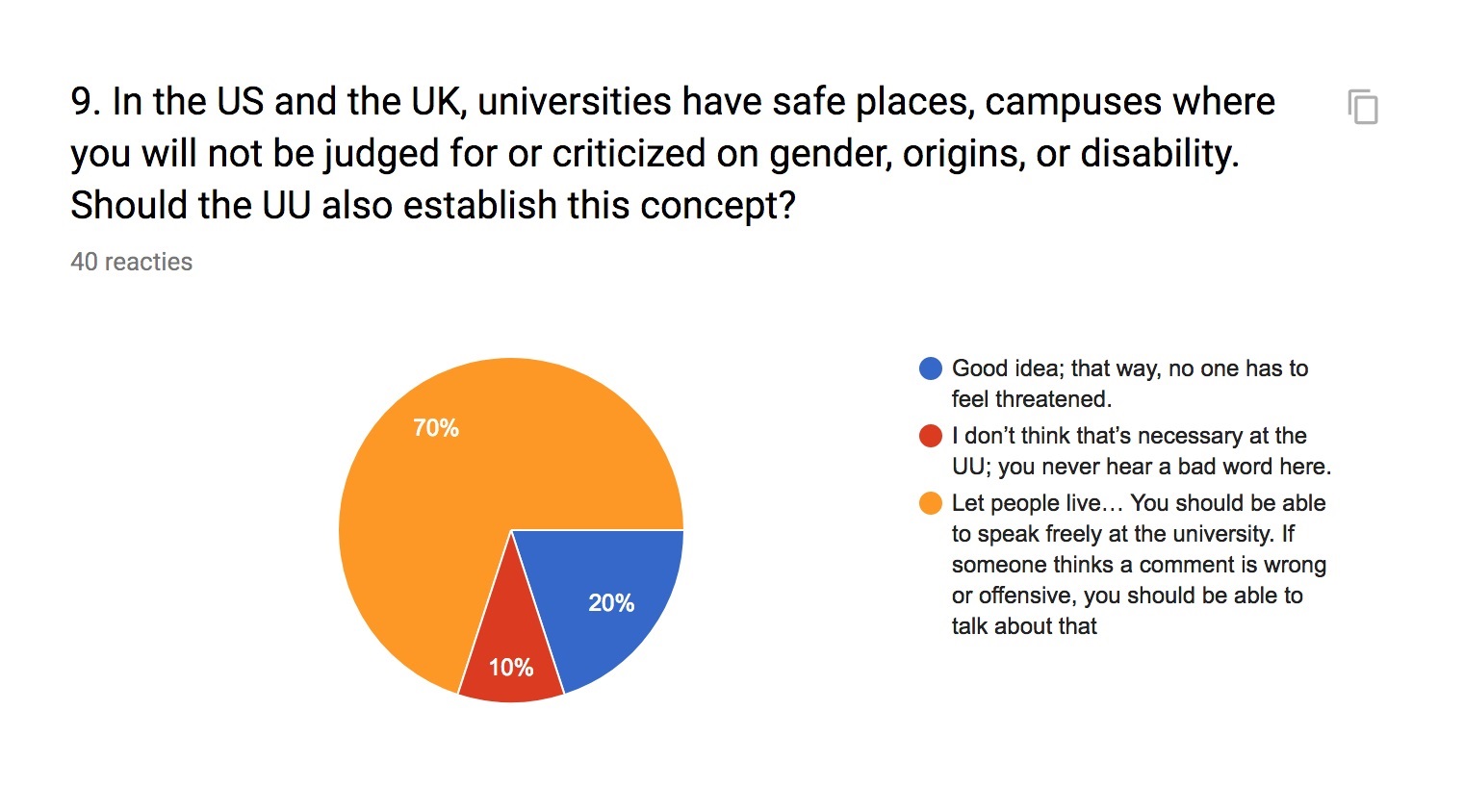
Sinterklaas should stay
Remarkable is that students and employees alike seem to cling to Dutch culture. In discussions about diversity, the question always remains: do you adapt to suit your guests, or should the guests adapt to you?
Students and employees in Utrecht feel that the UU is a Dutch university, and that they shouldn’t be forced to change traditions and habits to accommodate people from a different country or culture. Still, they want to be mindful of those groups, by presenting alternatives, for instance. The same ideas were reflected in the answers we received from international respondents.
Take Sinterklaas, for example. Only a small group (6 percent) thinks the UU should abolish the entire holiday, because we’re in a multicultural environment and should consider others. Over 50 percent feels that Sinterklaas should keep visiting the UU, while presenting an alternative to Zwarte Piet. Interestingly, over 40 percent wants to keep Zwarte Piet the way he is.
A comparable example is the question about ‘borrel’ culture. Keep what you have now, but at least offer more alternatives, such as non-alcoholic drinks and food that everyone is allowed to eat, a large majority says.
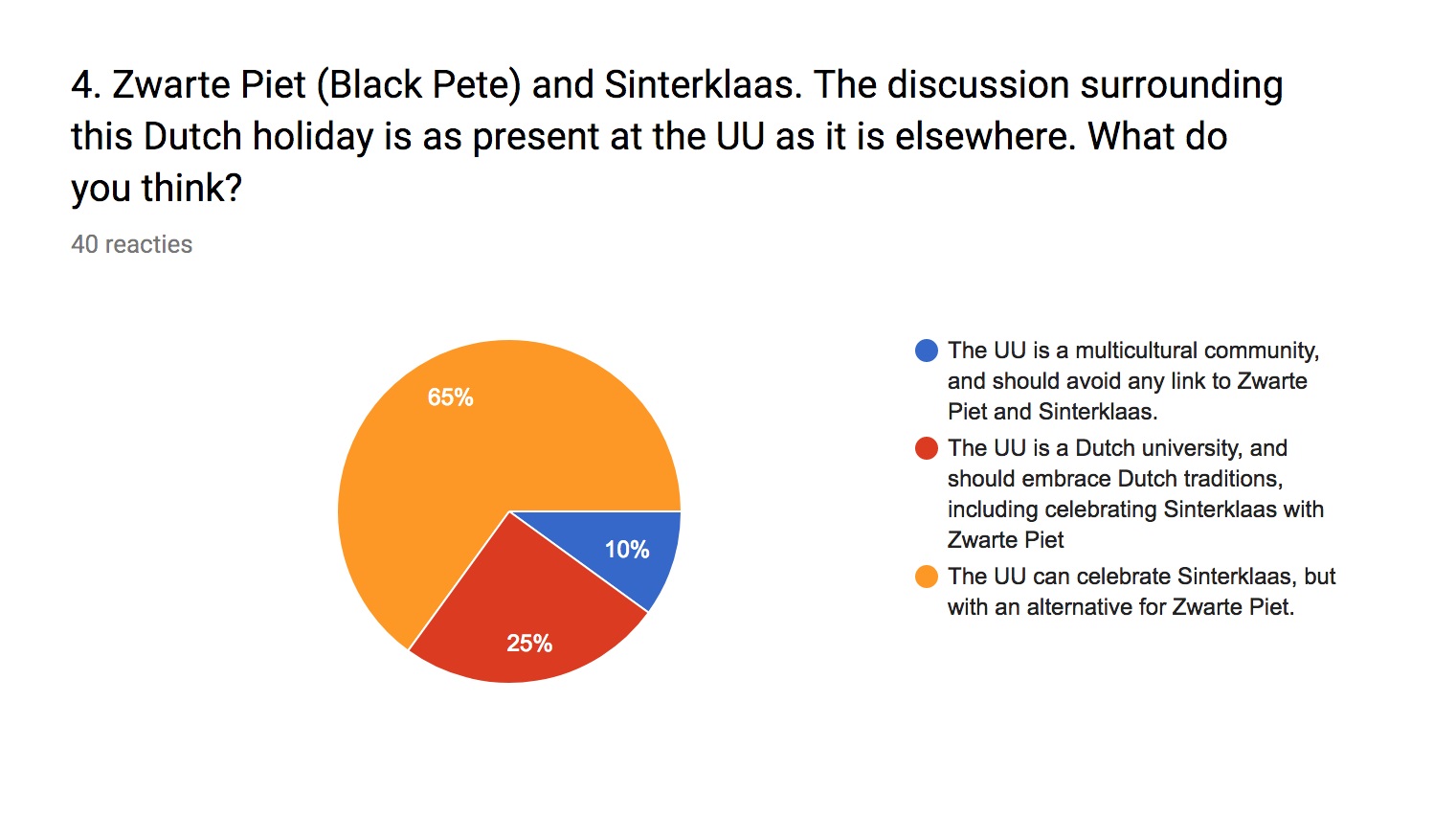
Results of the English survey
Interested in non-western perspectives
Our education could also become more conscious of the western perspective. In fact, most respondents think it’d be interesting to learn more about how other countries and continents feel about theories in certain courses.
Most respondents don’t object to collaborating with someone from a different culture. They don’t go looking for it, but prefer to let themselves be surprised. Still, the question remains how to deal with our biases. Experts say that in class, you should never confront someone directly with his or her origins or gender. Berteke Waaldijk says in the magazine: “They’ll be addressed solely on the basis of their looks. It’s better to create assignments in which all students’ experiences can be used.” Still, the questionnaire’s responses show that almost 80 percent – including internationals - say it’s fine to address someone on his origins.
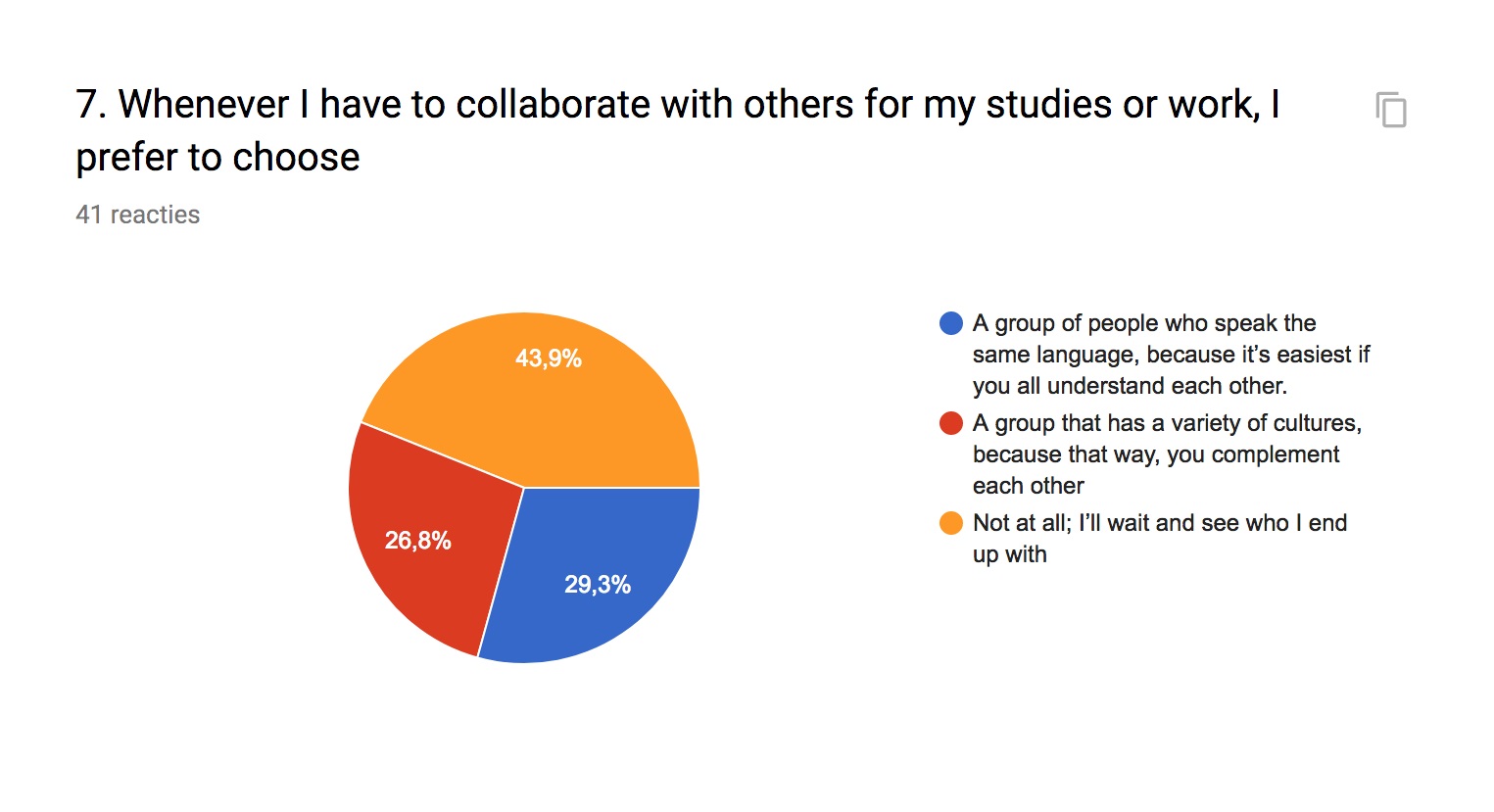
Results of the English survey
Quality versus bias
In the theme magazine, experts point out that you’re often unaware of your own (subconscious) biases. Still, over half of respondents think that teachers always look at quality when assessing tests or projects, and that anonymous testing isn’t necessary. You see the same when looking at the answers of the question about whether we need to take action to increase the number of female professors. Women have the same chances men do, when looking at quality, 45 percent say. A small percentage is in favor of quotas. And 46 percent say that the recruitment process should be improved, for instance by training committee members. A large majority of respondents agrees that a selection committee shouldn’t look at last names in order to prevent (subconscious) bias.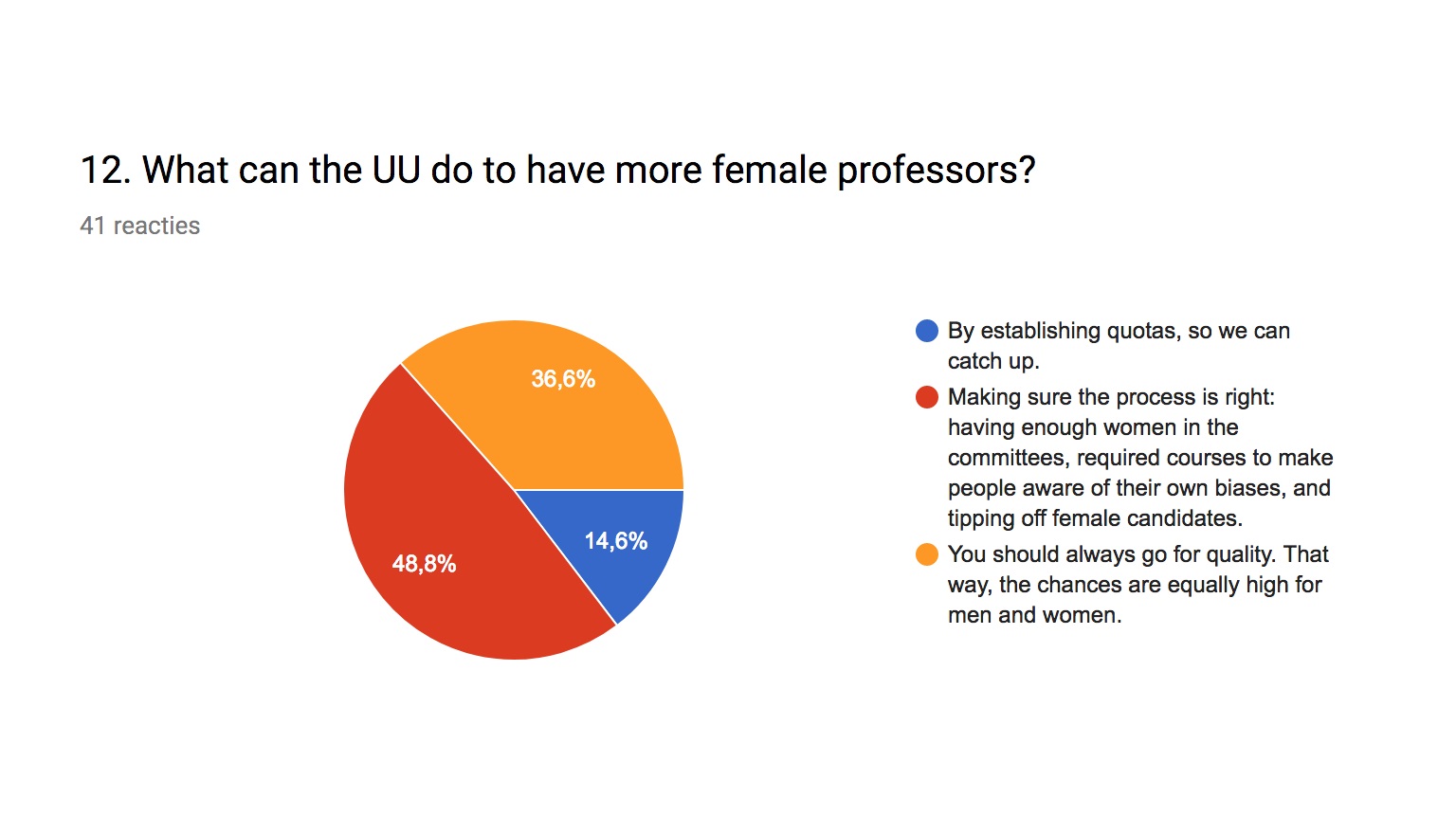
Results of the English survey
Translation: Indra Spronk